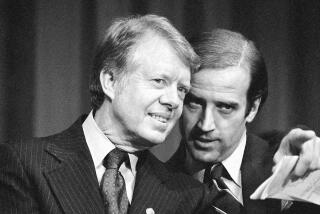U.S. Feared a Nuclear Argentina
WASHINGTON — U.S. efforts in the late 1970s to pressure Argentina to end the torture and killing of leftists were restrained in part by an American desire to keep the military junta from developing a nuclear bomb, newly declassified U.S. government papers show.
A State Department intelligence report from 1978 said that even while the Carter administration was stepping up pressure on the Argentine regime to curb the “dirty war” against dissidents, U.S. policymakers worried that pushing too hard could jeopardize efforts to convince the junta to join a treaty banning nuclear weapons in Latin America.
“Argentina’s nuclear status and capabilities have forced the United States to examine carefully the possibility that human rights initiatives could be detrimental to continued U.S. influence in the nuclear area,” said the report from the State Department’s Bureau of Intelligence and Research. “The U.S. human rights approach to Argentina has always been tempered by Argentina’s potential as a nuclear proliferator.”
The report was among 4,677 documents from 1975 to 1984 that were declassified and released by the State Department this week. The information had been requested by the families of the regime’s victims, human rights groups and governments that are considering prosecuting Argentine officials they accuse of human rights abuses.
Documents disclosed earlier this week suggested a clear difference between the Ford and Carter administrations in their policies on Argentina. The earlier documents indicate that leaders of the military regime believed that the Ford administration, which was in office when the junta took power, was not sincerely concerned about rights abuses.
The papers show that the generals repeatedly dismissed expressions of concern from the U.S. Embassy in Buenos Aires, saying they knew from personal visits to Washington that Secretary of State Henry Kissinger did not object to their campaign against the leftists.
The military government cracked down on insurgents beginning in March 1976 in an effort to end political violence that had racked the country since 1970. Thousands of Argentine citizens disappeared in the campaign, which the regime viewed as a war on terrorism.
When Jimmy Carter took office in 1977, he stepped up pressure on the Argentines to halt what his administration saw as gross human rights abuses. The U.S. cut back on military and economic aid and began collecting information on incidents of kidnapping, torture and killing.
By early 1978, Carter administration pressure had brought relations between the two countries to a “nadir,” the intelligence report notes. While U.S. officials continued to press on human rights issues, their desire to bring the junta around on the nuclear issue complicated the effort.
The report notes that the nuclear arms issue was a major item on the agenda when Carter met Argentine President Jorge Rafael Videla in September 1977, and when Secretary of State Cyrus Vance visited Buenos Aires two months later.
Though the South American nation does not possess nuclear weapons, analysts say it came close to developing them while the military ruled from 1976 to 1983. The prospect of a nuclear-armed Argentina was especially unnerving to U.S. officials because of the country’s rivalry with neighboring Brazil.
The report says the Argentines had not sought to use the nuclear weapons issue to win concessions from the U.S. in the human rights debate. Nonetheless, it says, they “undoubtedly appreciate the bargaining power of their nuclear chip,” and predicts that the generals “may attempt to inject it directly into human rights discussions.”
Carlos Osorios, an analyst at the National Security Archive, a nonprofit research organization that gathers declassified national security documents, said the report shows that the proliferation worries were a “very, very important factor” in shaping U.S. policy at the time.
F. Allen “Tex” Harris, a retired foreign service officer who was closely involved with the “dirty war” issue while at the U.S. Embassy in Buenos Aires in the late 1970s, said in an interview that the Argentine nuclear program “was a major concern of the Department of State and the defense establishment” at the time.
Even so, the biggest issue generating debate among U.S. policymakers, he said, was whether the policy should be shaped by the desire to influence Argentina’s human rights practices or whether the U.S. should take “a long-term view that it had to maintain good working relations with the military as the only stable entity in the country.”
More to Read
Sign up for Essential California
The most important California stories and recommendations in your inbox every morning.
You may occasionally receive promotional content from the Los Angeles Times.











